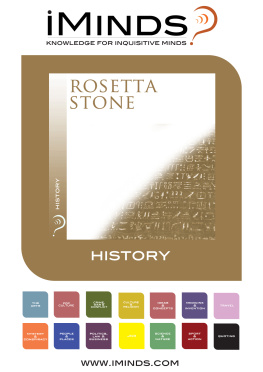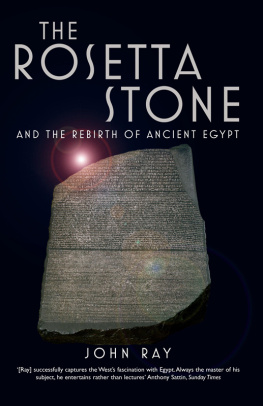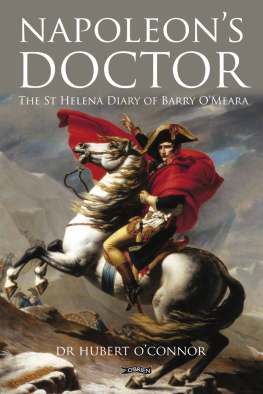Daniel Meyerson - The Linguist and the Emperor: Napoleon and Champollion’s Quest to Decipher the Rosetta Stone
Here you can read online Daniel Meyerson - The Linguist and the Emperor: Napoleon and Champollion’s Quest to Decipher the Rosetta Stone full text of the book (entire story) in english for free. Download pdf and epub, get meaning, cover and reviews about this ebook. year: 2004, publisher: Ballantine Books, genre: Non-fiction / History. Description of the work, (preface) as well as reviews are available. Best literature library LitArk.com created for fans of good reading and offers a wide selection of genres:
Romance novel
Science fiction
Adventure
Detective
Science
History
Home and family
Prose
Art
Politics
Computer
Non-fiction
Religion
Business
Children
Humor
Choose a favorite category and find really read worthwhile books. Enjoy immersion in the world of imagination, feel the emotions of the characters or learn something new for yourself, make an fascinating discovery.

- Book:The Linguist and the Emperor: Napoleon and Champollion’s Quest to Decipher the Rosetta Stone
- Author:
- Publisher:Ballantine Books
- Genre:
- Year:2004
- Rating:3 / 5
- Favourites:Add to favourites
- Your mark:
The Linguist and the Emperor: Napoleon and Champollion’s Quest to Decipher the Rosetta Stone: summary, description and annotation
We offer to read an annotation, description, summary or preface (depends on what the author of the book "The Linguist and the Emperor: Napoleon and Champollion’s Quest to Decipher the Rosetta Stone" wrote himself). If you haven't found the necessary information about the book — write in the comments, we will try to find it.
The emperor Napoleon and the linguist Jean-Francois Champollion were both blessed with the temperament of artists and damned with ferocious impatienceand both of them were obsessed with Egypt. In fact, it was Napoleons dazzling, disastrous Egyptian campaign that caught the attention of the young Champollion and forever changed his life. From the instant Champollion learned of Napoleons discovery of a stone inscribed with three sets of charactersGreek, Coptic, and hieroglyphiche could not rest. He vowed to be the first to crack the mystery of what became known as the Rosetta stone.
In Daniel Meyersons sweeping narrative, the haunting story of the Rosetta stoneits discovery in a doomed battle, the intrigue to secure it, the agonizing race to unlock its secrets, and the pain it seemed to inflict on all who touched itreads like the most engrossing fiction. Napoleon, despite his power and glory, suffered repeated betrayals . . . by his Empress Josephine, on the battlefield, and by history itself. Champollion, though he triumphed intellectually, ultimately endured his own terrible tragedy. As background and counterpoint to the stories of the brilliant linguist and the visionary emperor, Meyerson interweaves the ancient tales of love, intrigue, brutal death, and
miraculous rebirth that were hidden for centuries on the walls of Egyptian tombsstories that Champollion finally made accessible to the world.
Blending history, politics, intellectual passion, and a deep understanding of the human heart, The Linguist and the Emperor is a stunning tapestry of breakthrough and ambition, grandeur and vanity, power and pain. Carrying on the tradition of The Professor and the Madman and Longitude, Meyerson has fashioned a masterpiece of meticulous history and astonishing storytelling.
Daniel Meyerson: author's other books
Who wrote The Linguist and the Emperor: Napoleon and Champollion’s Quest to Decipher the Rosetta Stone? Find out the surname, the name of the author of the book and a list of all author's works by series.











